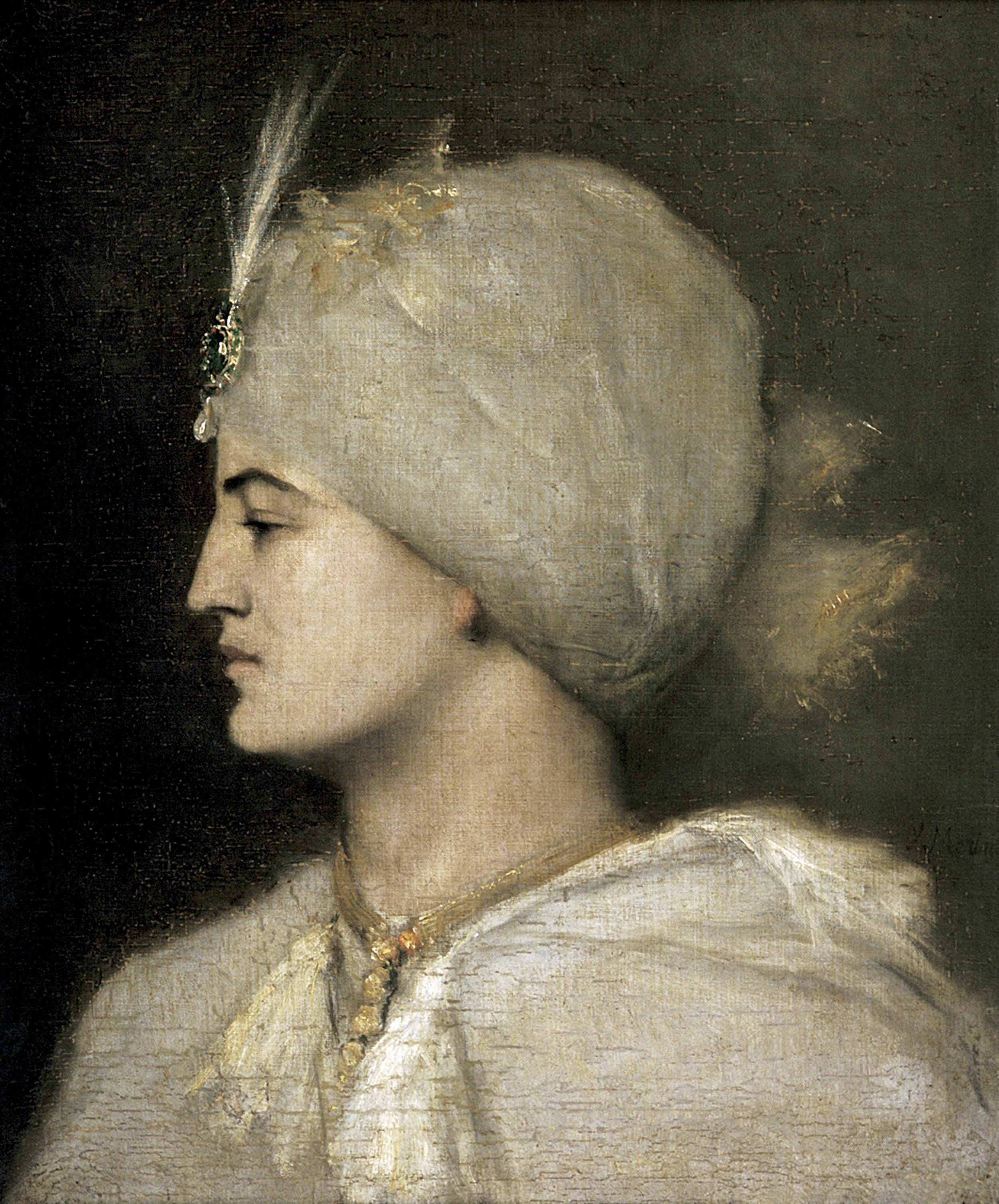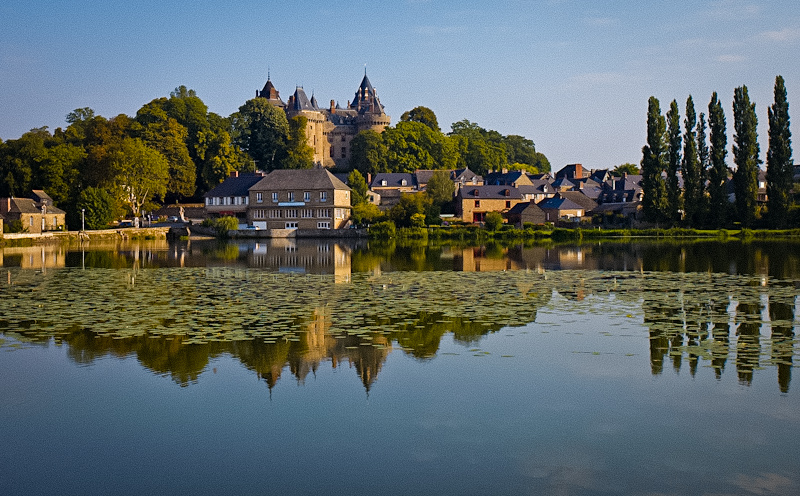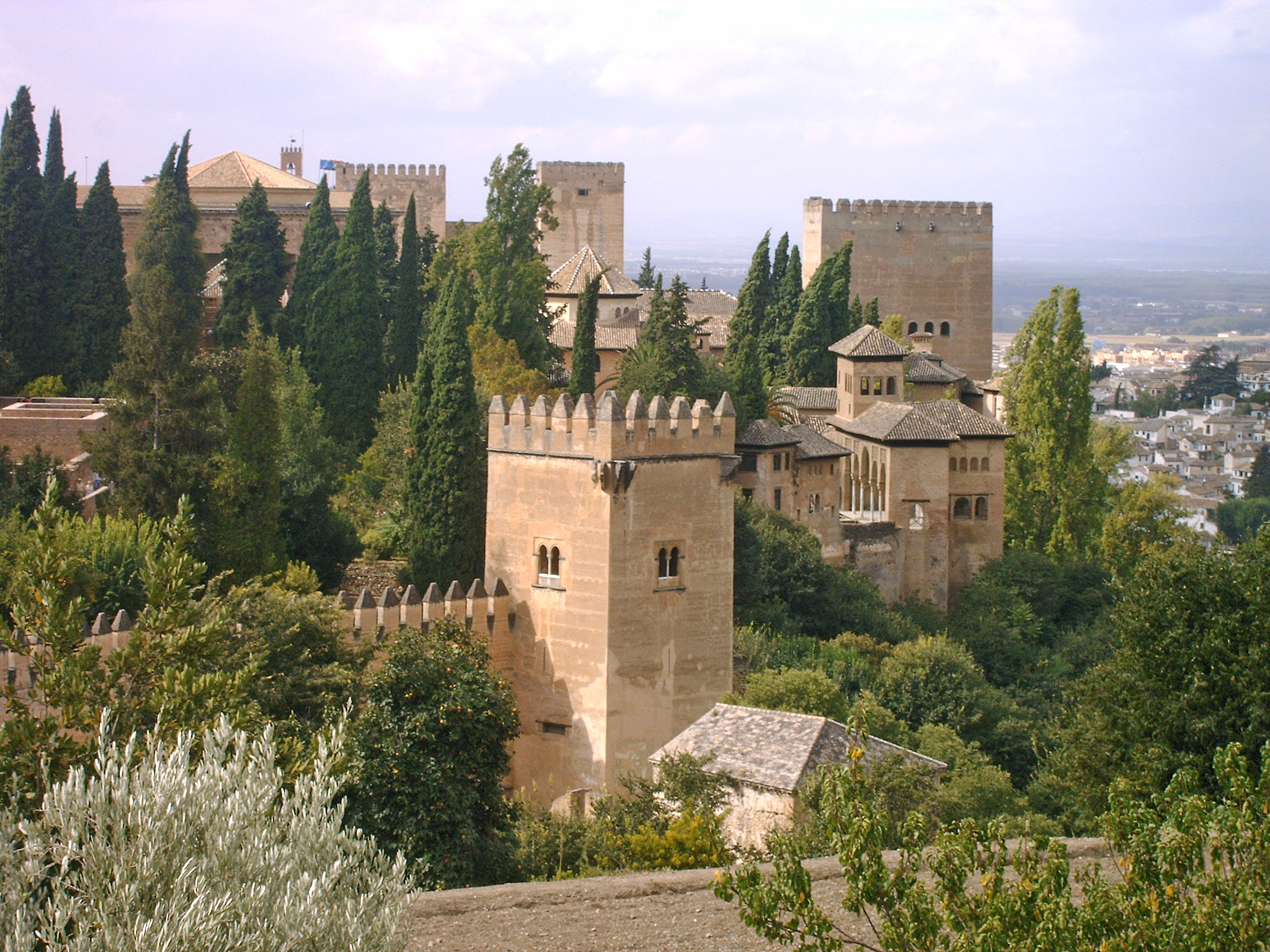|
Abencerrages
The Abencerrages or Abencerrajes (from the Arabic for "Saddler's Son")Chambers Biographical Dictionary, , page 3 were a family or faction that is said to have held a prominent position in the Kingdom of Granada in the 15th century. The name appears to have been derived from Yussuf ben-Serragh, the head of the tribe in the time of Muhammed VII, Sultan of Granada (1370–1408), who did that sovereign good service in his struggles to retain the crown of which he was three times deprived. Little is known of the family with certainty. The Chambers Biographical Dictionary records that they arrived in Spain in the 8th century but the name is familiar from the romance by Ginés Pérez de Hita, ''Guerras civiles de Granada'', which celebrates the feuds of the Abencerrages and the rival family of the Benedin (Arabic banu Edin), and the cruel treatment to which the former were subjected. J. P. de Florian's ''Gonsalve de Cordoue'' and Chateaubriand's ''Le dernier des Abencerrages'' are ... [...More Info...] [...Related Items...] OR: [Wikipedia] [Google] [Baidu] |
L'esule Di Granata
(''The Exile of Granada'') is a ''melodramma serio'' (serious opera) in two acts by Giacomo Meyerbeer. The Italian libretto was by Felice Romani based on the rivalries between the Zegridi and the Abenceraggi factions in the last days of the kingdom of Granada. It is the fifth of Meyerbeer's Italian operas but had only three confirmed stagings in the 19th century. The world premiere took place at La Scala, Milan, on 12 March, 1822. Background Born in Berlin to a wealthy family, as a young man Giacomo Meyerbeer had musical ambitions and studied and traveled in Italy. Much impressed and influenced by the leading Italian composer of operas of the day, Rossini, Meyerbeer composed an opera in the style of that composer, ''Romilda e Costanza'', which was produced in Padua in 1817. He then went on to compose three further operas in Italian for three different cities - '' Semiramide riconosciuta'', Turin 1819, '' Emma di Resburgo'', Venice, also 1819, and ''Margherita d'Anjou'', for ... [...More Info...] [...Related Items...] OR: [Wikipedia] [Google] [Baidu] |
Les Abencérages
(English: ''The Abencerrages, or The standard of Granada'') is an opera in three acts by Luigi Cherubini with a French libretto by Etienne de Jouy, based on the novel ''Gonzalve de Cordoue'' by Jean-Pierre Claris de Florian. It was first performed on 6 April 1813 by the Académie Impériale de Musique ( Paris Opera) at the Salle Montansier, with Napoleon and his wife, the Empress Marie-Louise, in the audience. The opera was initially a success but its popularity waned after the fall of Napoleon. Because of its use of large choruses, spectacle and extensive dance music as well as its story line of a love affair played out against the background of major historical events, ''Les Abencérages'' is considered an important precursor of French grand opera. Almanzor's tenor aria, ''Suspendez de ses murs'', was admired by composers such as Berlioz and has been recorded by singers including Georges Thill and Roberto Alagna. The ballet music in the first act contains variations on the ... [...More Info...] [...Related Items...] OR: [Wikipedia] [Google] [Baidu] |
Alhambra
The Alhambra (, ; ar, الْحَمْرَاء, Al-Ḥamrāʾ, , ) is a palace and fortress complex located in Granada, Andalusia, Spain. It is one of the most famous monuments of Islamic architecture and one of the best-preserved palaces of the historic Islamic world, in addition to containing notable examples of Spanish Renaissance architecture. The complex was begun in 1238 by Muhammad I Ibn al-Ahmar, the first Nasrid emir and founder of the Emirate of Granada, the last Muslim state of Al-Andalus. It was built on the Sabika hill, an outcrop of the Sierra Nevada which had been the site of earlier fortresses and of the 11th-century palace of Samuel ibn Naghrillah. Later Nasrid rulers continuously modified the site. The most significant construction campaigns, which gave the royal palaces much of their definitive character, took place in the 14th century during the reigns of Yusuf I and Muhammad V. After the conclusion of the Christian Reconquista in 1492, the site became th ... [...More Info...] [...Related Items...] OR: [Wikipedia] [Google] [Baidu] |
The Abencerraje
''The Abencerraje,'' also known as ''The History of the Abencerraje and the Lovely Jarifa'' (Modern Spanish: ), is a 'Moorish novel' () written in Spain in the sixteenth century. Although it was published anonymously, some scholars believe that its author was . Various versions were published between 1561 and 1565. However, the most polished and complete is considered to be that included in the ''Inventario'', a compilation by Antonio de Villegas printed in Medina del Campo in 1565. The novel takes place in the 15th century, when Castile and the Emirate of Granada were competing for supremacy over southern Spain. It shows how its characters, the Moor Abindarráez and the Christian Rodrigo de Narváez, can live in harmony despite their religious differences. It explores themes such as love and chivalry. Synopsis The tale is set in the 15th century, when John II ruled the Crown of Castile. We meet Rodrigo de Narváez, a knight whose heroic feats in the war against the Moors ha ... [...More Info...] [...Related Items...] OR: [Wikipedia] [Google] [Baidu] |
François-René De Chateaubriand
François-René, vicomte de Chateaubriand (4 September 1768 – 4 July 1848) was a French writer, politician, diplomat and historian who had a notable influence on French literature of the nineteenth century. Descended from an old aristocratic family from Brittany, Chateaubriand was a royalist by political disposition. In an age when large numbers of intellectuals turned against the Church, he authored the ''Génie du christianisme'' in defense of the Catholic faith. His works include the autobiography ''Mémoires d'Outre-Tombe'' ("''Memoirs from Beyond the Grave''"), published posthumously in 1849–1850. Historian Peter Gay says that Chateaubriand saw himself as the greatest lover, the greatest writer, and the greatest philosopher of his age. Gay states that Chateaubriand "dominated the literary scene in France in the first half of the nineteenth century". Biography Early years and exile Born in Saint-Malo on 4 September 1768, the last of ten children, Chateaubriand ... [...More Info...] [...Related Items...] OR: [Wikipedia] [Google] [Baidu] |
El último Abencerraje
EL, El or el may refer to: Religion * El (deity), a Semitic word for "God" People * EL (rapper) (born 1983), stage name of Elorm Adablah, a Ghanaian rapper and sound engineer * El DeBarge, music artist * El Franco Lee (1949–2016), American politician * Ephrat Livni (born 1972), American street artist Arts, entertainment, and media Fictional entities * El, a character from the manga series ''Shugo Chara!'' by Peach-Pit * El, short for Eleven, a fictional character in the TV series '' Stranger Things'' * El, family name of Kal-El (Superman) and his father Jor-El in '' Superman'' *E.L. Faldt, character in the road comedy film '' Road Trip'' Literature * ''Él'', 1926 autobiographical novel by Mercedes Pinto * ''Él'' (visual novel), a 2000 Japanese adult visual novel Music * Él Records, an independent record label from the UK founded by Mike Alway * ''Él'' (Lucero album), a 1982 album by Lucero * "Él", Spanish song by Rubén Blades from ''Caminando'' (album) * "Él" ... [...More Info...] [...Related Items...] OR: [Wikipedia] [Google] [Baidu] |
Giacomo Meyerbeer
Giacomo Meyerbeer (born Jakob Liebmann Beer; 5 September 1791 – 2 May 1864) was a German opera composer, "the most frequently performed opera composer during the nineteenth century, linking Mozart and Wagner". With his 1831 opera ''Robert le diable'' and its successors, he gave the genre of grand opera 'decisive character'. Meyerbeer's grand opera style was achieved by his merging of German orchestra style with Italian vocal tradition. These were employed in the context of sensational and melodramatic libretti created by Eugène Scribe and were enhanced by the up-to-date theatre technology of the Paris Opéra. They set a standard which helped to maintain Paris as the opera capital of the nineteenth century. Born to a rich Jewish family, Meyerbeer began his musical career as a pianist but soon decided to devote himself to opera, spending several years in Italy studying and composing. His 1824 opera '' Il crociato in Egitto'' was the first to bring him Europe-wide reputation, but ... [...More Info...] [...Related Items...] OR: [Wikipedia] [Google] [Baidu] |
Luigi Cherubini
Luigi Cherubini ( ; ; 8 or 14 SeptemberWillis, in Sadie (Ed.), p. 833 1760 – 15 March 1842) was an Italian Classical and Romantic composer. His most significant compositions are operas and sacred music. Beethoven regarded Cherubini as the greatest of his contemporaries. His operas were heavily praised and interpreted by Rossini. Early years Cherubini was born Maria Luigi Carlo Zenobio Salvatore Cherubini in Florence in 1760. There is uncertainty about his exact date of birth. Although 14 September is sometimes stated, evidence from baptismal records and Cherubini himself suggests the 8th is correct. Perhaps the strongest evidence is his first name, Maria, which is traditional for a child born on 8 September, the feast-day of the Nativity of the Virgin. His instruction in music began at the age of six with his father, Bartolomeo, '' maestro al cembalo'' ("Master of the harpsichord", in other words, ensemble leader from the harpsichord). Considered a child prodigy, Cherubini st ... [...More Info...] [...Related Items...] OR: [Wikipedia] [Google] [Baidu] |
Tales Of The Alhambra
''Tales of the Alhambra'' (1832) is a collection of essays, verbal sketches and stories by American author Washington Irving (1783–1859) inspired by, and partly written during, his 1828 visit to the palace/fortress complex known as the Alhambra in Granada, Andalusia, Spain. Background Shortly after completing a biography of Christopher Columbus in 1828, Washington Irving travelled from Madrid, where he had been staying, to Granada, Spain. At first sight, he described it as "a most picturesque and beautiful city, situated in one of the loveliest landscapes that I have ever seen." Irving was preparing a book called ''A Chronicle of the Conquest of Granada'', a history of the years 1478–1492, and was continuing his research on the topic.Burstein, Andrew. ''The Original Knickerbocker: The Life of Washington Irving''. New York: Basic Books, 2007: 210. He immediately asked the then-governor of the historic Alhambra Palace as well as the archbishop of Granada for access to the pal ... [...More Info...] [...Related Items...] OR: [Wikipedia] [Google] [Baidu] |
Washington Irving
Washington Irving (April 3, 1783 – November 28, 1859) was an American short-story writer, essayist, biographer, historian, and diplomat of the early 19th century. He is best known for his short stories "Rip Van Winkle" (1819) and " The Legend of Sleepy Hollow" (1820), both of which appear in his collection ''The Sketch Book of Geoffrey Crayon, Gent.'' His historical works include biographies of Oliver Goldsmith, Muhammad and George Washington, as well as several histories of 15th-century Spain that deal with subjects such as Alhambra, Christopher Columbus and the Moors. Irving served as American ambassador to Spain in the 1840s. Born and raised in Manhattan to a merchant family, Irving made his literary debut in 1802 with a series of observational letters to the ''Morning Chronicle'', written under the pseudonym Jonathan Oldstyle. He temporarily moved to England for the family business in 1815 where he achieved fame with the publication of ''The Sketch Book of Geoffrey Cr ... [...More Info...] [...Related Items...] OR: [Wikipedia] [Google] [Baidu] |
Ibrahim Benedin
Ibrahim ( ar, إبراهيم, links=no ') is the Arabic name for Abraham, a Biblical patriarch and prophet in Islam. For the Islamic view of Ibrahim, see Abraham in Islam. Ibrahim may also refer to: * Ibrahim (name), a name (and list of people with the name) * Ibrahim (sura), a sura of the Qur'an * '' Ibrahim el Awal'', a Hunt-class destroyer that served in the Egyptian navy under that name 1951-56 * Ibrahim prize, a prize to recognise good governance in Africa * "Ibrahim", a song by David Friedman from ''Shades of Change'' See also * Ibrahimzai Ibrahimzai ( ps, ابراهيمزی), also called Burhan, Boran or Brahim, are one of the two main branches of the Ghilji Pashtun Pashtuns (, , ; ps, پښتانه, ), also known as Pakhtuns or Pathans, are an Iranian ethnic group who are ..., a Pashtun tribe of Afghanistan * Ibrahima * Abraham (other) * Avraham (other) {{disambiguation ... [...More Info...] [...Related Items...] OR: [Wikipedia] [Google] [Baidu] |






